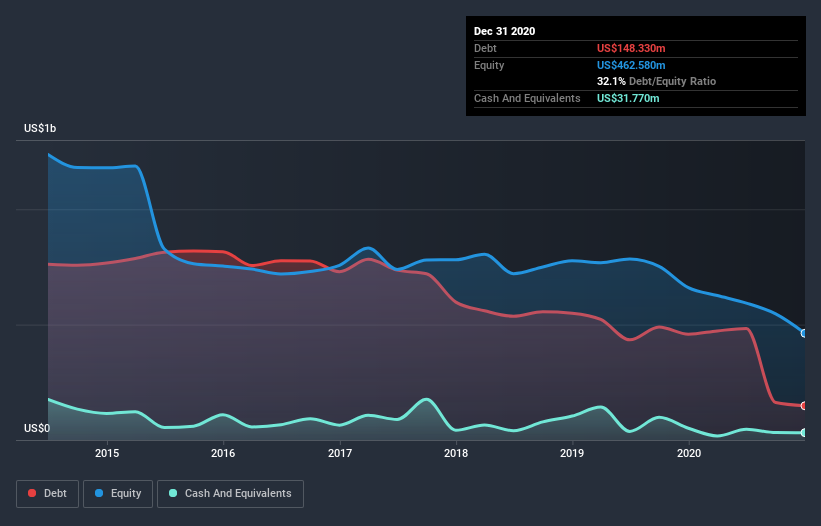The external fund manager backed by Berkshire Hathaway's Charlie Munger, Li Lu, makes no bones about it when he says 'The biggest investment risk is not the volatility of prices, but whether you will suffer a permanent loss of capital.' It's only natural to consider a company's balance sheet when you examine how risky it is, since debt is often involved when a business collapses. Importantly, Masisa S.A. (SNSE:MASISA) does carry debt. But the more important question is: how much risk is that debt creating?
What Risk Does Debt Bring?
Debt assists a business until the business has trouble paying it off, either with new capital or with free cash flow. Part and parcel of capitalism is the process of 'creative destruction' where failed businesses are mercilessly liquidated by their bankers. However, a more usual (but still expensive) situation is where a company must dilute shareholders at a cheap share price simply to get debt under control. Of course, debt can be an important tool in businesses, particularly capital heavy businesses. When we examine debt levels, we first consider both cash and debt levels, together.
View our latest analysis for Masisa
What Is Masisa's Debt?
You can click the graphic below for the historical numbers, but it shows that Masisa had US$148.3m of debt in December 2020, down from US$458.4m, one year before. However, it does have US$31.8m in cash offsetting this, leading to net debt of about US$116.6m.

How Strong Is Masisa's Balance Sheet?
We can see from the most recent balance sheet that Masisa had liabilities of US$129.1m falling due within a year, and liabilities of US$111.5m due beyond that. Offsetting these obligations, it had cash of US$31.8m as well as receivables valued at US$76.5m due within 12 months. So its liabilities total US$132.4m more than the combination of its cash and short-term receivables.
This deficit is considerable relative to its market capitalization of US$168.3m, so it does suggest shareholders should keep an eye on Masisa's use of debt. This suggests shareholders would be heavily diluted if the company needed to shore up its balance sheet in a hurry. When analysing debt levels, the balance sheet is the obvious place to start. But you can't view debt in total isolation; since Masisa will need earnings to service that debt. So if you're keen to discover more about its earnings, it might be worth checking out this graph of its long term earnings trend.
Over 12 months, Masisa reported revenue of US$574m, which is a gain of 43%, although it did not report any earnings before interest and tax. With any luck the company will be able to grow its way to profitability.
Caveat Emptor
Despite the top line growth, Masisa still had an earnings before interest and tax (EBIT) loss over the last year. To be specific the EBIT loss came in at US$5.7m. Considering that alongside the liabilities mentioned above does not give us much confidence that company should be using so much debt. So we think its balance sheet is a little strained, though not beyond repair. We would feel better if it turned its trailing twelve month loss of US$160m into a profit. So in short it's a really risky stock. The balance sheet is clearly the area to focus on when you are analysing debt. However, not all investment risk resides within the balance sheet - far from it. For instance, we've identified 2 warning signs for Masisa (1 can't be ignored) you should be aware of.
When all is said and done, sometimes its easier to focus on companies that don't even need debt. Readers can access a list of growth stocks with zero net debt 100% free, right now.
When trading Masisa or any other investment, use the platform considered by many to be the Professional's Gateway to the Worlds Market, Interactive Brokers. You get the lowest-cost* trading on stocks, options, futures, forex, bonds and funds worldwide from a single integrated account. Promoted
New: Manage All Your Stock Portfolios in One Place
We've created the ultimate portfolio companion for stock investors, and it's free.
• Connect an unlimited number of Portfolios and see your total in one currency
• Be alerted to new Warning Signs or Risks via email or mobile
• Track the Fair Value of your stocks
This article by Simply Wall St is general in nature. It does not constitute a recommendation to buy or sell any stock, and does not take account of your objectives, or your financial situation. We aim to bring you long-term focused analysis driven by fundamental data. Note that our analysis may not factor in the latest price-sensitive company announcements or qualitative material. Simply Wall St has no position in any stocks mentioned.
*Interactive Brokers Rated Lowest Cost Broker by StockBrokers.com Annual Online Review 2020
Have feedback on this article? Concerned about the content? Get in touch with us directly. Alternatively, email editorial-team (at) simplywallst.com.
About SNSE:MASISA
Masisa
Manufactures and sells wooden boards for furniture solutions and interior spaces in Chile, the United States, Peru, Colombia, Ecuador, Canada, China, Vietnam, South Korea, and internationally.
Flawless balance sheet and slightly overvalued.
Market Insights
Community Narratives



